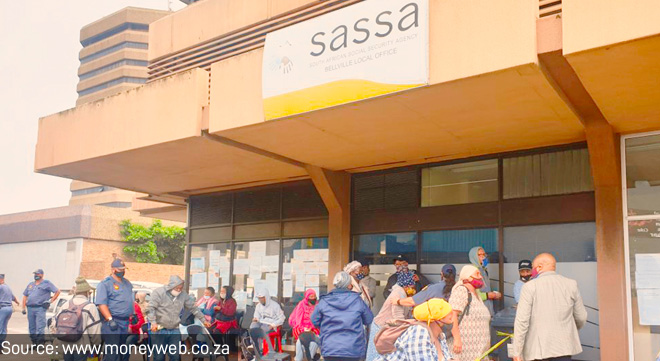It is likely that the Social Relief of Distress (SRD) grant will never be scrapped. However, there is contention over the amount to which it should be adjusted, say Momentum economist Sanisha Packirisamy and Herman van Papendorp, its head of investment research and asset allocation.
They were commenting on President Cyril Ramaphosa’s statement, during his State of the Nation Address, that the government will continue the SRD grant and is developing “a mechanism for targeted basic income support”.
The SRD grant of R350 a month was introduced in May 2020 as “a temporary measure” to support the most vulnerable during the lockdown.
“We will ensure that existing social grants are increased to cushion the poor against rising inflation. This will be set out in the budget by the Minister of Finance,” Ramaphosa said.
“Work is under way to develop a mechanism for targeted basic income support for the most vulnerable, within our fiscal constraints. This will build on the innovation we have introduced through the SRD grant, including linking the data that we have across government to make sure we reach all those who are in need.”
Although the president announced an extension of the grant beyond the 2023/24 fiscal year, the timelines were not clear.
He also intimated that National Treasury was considering measures to mitigate the effect of load shedding on food prices, but no further detail was provided.
The Medium-term Budget Policy Statement in October 2022 provided for the SRD grant until March 2024, even though the sizeable amounts parked under unallocated expenditure most likely made provision for a further extension, according to the Bureau for Economic Research (BER).
In October, Treasury budgeted for a 2.3% rise in total expenditure on social grants (including the SRD grant) in 2023/24. This was set to decline by about 10% in 2024/25, as it was assumed the SRD grant would fall away, and then to increase by 4.5% in 2025/26, the BER said.
Assuming grant expenditure increases by 5.5% in 2023/24 (in line with consensus expectations for headline CPI in 2023) and 4.5% in the following two fiscal years, social grant outlays over the next three fiscal years will be roughly R100bn more than set out in October. This will more than consume the unallocated expenditure reserve that totals R89bn through 2025/26, the BER said.
What a BIG could cost
Momentum’s analysts said the Institute for Economic Justice calculated that a universal basic income grant (BIG) would amount to between R275 billion and R355bn a year (the government’s social grant allocation for fiscal year 2022/23 is R250bn).
“In addition, the financing of the social grant remains a challenge in the context of National Treasury’s commitment to fiscal consolidation over the medium term, which would imply a more permanent tax adjustment or a decrease in other forms of social expenditure to protect the government’s purse.
“In our view, rating agencies are unlikely to react negatively to making the social grant permanent, given its ability to offer significant redistributive opportunities, as long as it can be introduced in a manner that is fiscally and economically sustainable.
“The World Bank proved that the system in South Africa is particularly successful in reaching the poorest individuals, given that social assistance programmes in South Africa reduced the poverty gap by 31.9% relative to 26.7% for the typical upper-middle income country,” Packirisamy and Van Papendorp said.
Tax implications
Research by Intellidex in 2022 outlined the cost and funding complications of a BIG. It estimated that personal income tax, value-added tax and corporate income tax would have to increase by just under 5% to raise R50bn, or by slightly more than 9% to raise R100bn, if all three taxes were harnessed to fund a BIG.
Read: By how much will taxes have to increase to pay for a basic income grant?
Intellidex used R50bn and R100bn as the indicative costs of a BIG. It said these numbers were significantly smaller than what most proponents of a BIG hoped to spend and were, therefore, a conservative estimate of the costs.
It said proposals for a BIG have ranged from a modest R240 given to households that initially qualified for the SRD grant to a universal living wage grant of R3 500 given to everyone.
How many people are receiving the grant?
The number of people who have been approved for the SRD grant has declined considerably, Packirisamy and Van Papendorp said. Stringent bank verification requirements and exclusionary provisions led to a decrease in the number of applications from 15.9 million (10.9 million approved) in March to 12.2 million in August (7.4 million approved).
The president said the grant is currently reaching 7.8 million individuals.
The initial decline in approvals was due to a cut in the means test threshold to R350, which excluded several beneficiaries. This threshold has since been raised to R624 after civil rights action, Packirisamy and Van Papendorp said.



